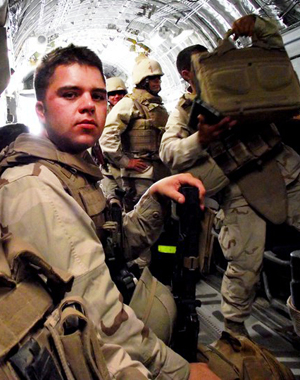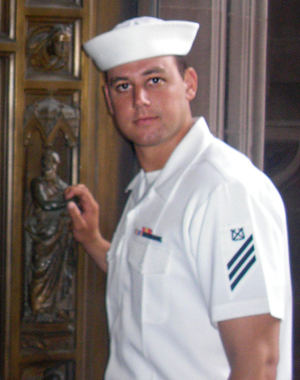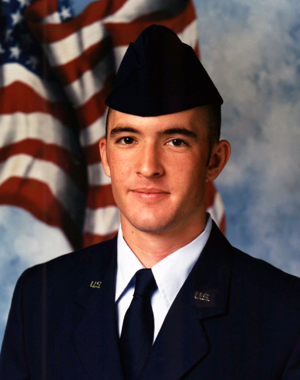Trio Salute
First Veterans Welcomed Into President’s Scholars Program
FROM the armed forces to the university’s elite student corps, three veterans are among this year’s new Cal State Fullerton President's Scholars.
The trio — Peter Bahnev, 26, Jacob Gomez, 26, and Ron McGill, 32 — are juniors.
“Because of their service to the nation, we decided to open this program up to returning veterans,” said Deanna Merino-Contino, director of the President's Scholars program. “Our veterans, following their service, attended other colleges for two years so they are transferring in as juniors. We decided to try a pilot program with three veterans and, so far, we've been very impressed.”
Bahnev of Huntington Beach, Gomez of Placentia and McGill of Irvine, have all served at least four years in the armed forces and have been stationed overseas at some point in their military careers.
To be considered a President's Scholar, students must maintain a 3.75 or higher grade-point average and provide community service.
“It was interesting when we held our orientation session this summer,” Merino-Contino said. “The students were interested in the vets' stories, and the vets added a degree of maturity and real-world experience that the students appreciated. We have team-building exercises and you can see, in the vets, that their focus is to ‘make sure they achieve their mission.’ ”
 Caption: Peter Bahnev while on duty as a petty officer.
Caption: Peter Bahnev while on duty as a petty officer.
Peter Bahnev
United States Navy (Active Duty 2004-08, Selected Reserves 2008-present)
Classification: E-5 Petty Officer, Second Class
Major: communications-advertising
Bahnev almost missed the chance to become a President's Scholar. He was stationed in Kandahar, Afghanistan, and his scheduled video interview via Skype with the President's Scholars review panel was blocked by technical difficulties, necessitating a three-mile hike to a satellite facility that could patch him through to Germany, then Mississippi, then California.
That hike paid off, and he now is taking courses in advertising at Cal State Fullerton.
Following enlistment in the Navy, he was deployed on aircraft carriers, where he served as an information systems technician, using satellite and radio technologies to provide operational commuications with troops on patrol and in battle. He received numerous honors for his service from the other military branches and NATO during his career.
“I enjoy meeting with all the other President's Scholars and the students at Fullerton,” he said. “I like the scholars because they're so energetic and full of ideas.”
Often, Bahnev said he feels he must work harder and participate more just to stay on par with the freshman scholars.
“I am very proud and grateful to be part of such a prestigious group of CSUF students. They have a history of achieving momentous accomplishments at a very young age,” he said. “I think my role will be to help motivate those who need encouragement, tutor those who need a helping hand and listen to those who need a compassionate ear. I will take care of my classmates, my university and my community in the same way I took care of my brothers and sisters in arms.”
Bahnev also is active in the Student Veterans Association and appreciates that the group works to support other veterans.
“SVA is a network for us to participate in and take advantage of CSUF programs and opportunities,” he said. “It’s a close-knit community where a vet can receive the support needed for transitioning from the frontline to the classroom.”
In addition to his studies, Bahnev works part time in the Department of Secondary Education as a student assistant.
He continues in the reserves and drills with SEAL Team 17 at the Naval Amphibious Base one weekend a month and two full weeks a year.
“Cal State Fullerton has really been good to me,” he said. “In addition to the President’s Scholars program, I am also a Dean's Scholar (in the Department of Communications) and work to promote our Irvine Campus as this year's proud recipient of the CSUF/Irvine Campus Shea Homes Scholarship.”
Bahnev also credits the military service with helping him develop the wisdom and the skills needed to be successful in school.
“You learn to take orders, give orders, make decisions and inspire others to perform at their highest levels,” he said. “Thanks to CSUF's military-friendly environment, staff and support programs, veterans returning from the war are empowered to utilize their military experience for a successful life outside the military.”
 Caption: Jacob Gomez served in the Navy on anti-piracy patrol.
Caption: Jacob Gomez served in the Navy on anti-piracy patrol.
Jacob Gomez
United States Navy (2003-07)
Classification: E-4, Boatswain's Mate
Major: criminal justice and psychology
As a young boy growing up in a military family in Salinas, Gomez was always drawn to the ocean. After graduating from high school, he joined the Navy.
“Both my father and grandfather were in the armed services so it just seemed like the thing to do.”
Following training, Gomez drew dangerous duty as part of an anti-piracy team involved in search and seizure off the coast of Africa and throughout the Middle East, including Yemen, Somalia, Dubai, Bahrain and the Suez Canal.
“We would get intelligence, usually from air support, that a suspicious boat was spotted 600 to 700 miles off the coast,” he said. “It's dangerous work because most pirates are trafficking in drugs, weapons or people ... and they don't like to be caught. We'd pull up alongside them and tell them to anchor or stop so we could board.”
Then, Gomez, armed with an MK-18 CQB (close quarters battle) machine gun, would board and search the boat. He was shot at multiple times while searching more than 200 boats during his military career, but escaped injury.
He said he believes his military service provides him with maturity and perspective.
“When you’ve been in life-threatening situations, you're not as apt to worry about not being able to afford the latest style of shoes,” he chuckled. “I also take my studies very seriously.”
According to Gomez, the military taught him the importance of punctuality (he is always about half an hour early to class), responsibility (completing his assignments by the deadline) and respect (he finds it disrespectful when students are texting during class). He said he's surprised by students who value “partying” more than completing their assignments.
“The military is the reason I’m here,” he said. “They take you out of your comfort zone and place you in situations where you have to take charge and make good, reasoned decisions — if you don’t, someone could be killed or seriously hurt.”
In addition to his classes, Gomez also works in the university’s data center and volunteers at the Placentia VFW.
“It was a bit of an adjustment when I left the military and began my studies,” he admitted. “I appreciate the chance that Cal State Fullerton has given me to complete my studies. I love it here.”
 Caption: Ron McGill maintains a 4.0 grade point average.
Caption: Ron McGill maintains a 4.0 grade point average.
Ron McGill
United States Air Force (1998-2001)
Classification: E-4 Senior Airman
Major: communicative disorders
For four years in Germany, McGill was responsible for "the flight line." His job was loading the planes with any provisions needed during flight — food, water, first-aid items — as well as any logistical items needed for safety.
After Germany, he returned to the U.S. and spent six years working in the corporate offices of Walt Disney Productions while attending college part time. In college, he became interested in communicative disorders and had heard of Cal State Fullerton's excellent reputation in this field. Being accepted to the President's Scholars program sealed the deal.
“First, I wasn’t sure if I'd be accepted into the program,” he said. “It’s very competitive. So getting into the program was great ... and then with the scholarship, it was even better. I couldn't believe that I was so lucky. I interviewed with the panel for the President's Scholars, and the next day they called to tell me I'd been accepted into the program.”
McGill said he believes his military experience has helped him develop the structure and attention to detail that makes him a good student.
“The military helps you develop good study habits since there's such a focus on achieving goals,” he said. “I don’t often stop to think about whether or not I like an assignment — I just do it. I'm also good at planning ahead. I have my studies mapped out. I know when assignments are due, and I plan accordingly. The trick, for me, is to break down my assignments into smaller steps.”
McGill spends time volunteering for Habitat for Humanity, the Surfrider Foundation, Oxfam and the Sierra Club and promoting bicycle advocacy. He also works with a group called Brain Rehabilitation and Injury Network (B.R.A.I.N.). Since many vets with traumatic brain injuries develop communicative disorders, it's recommended that they talk often, one-on-one, with someone. That's a role he says he is happy to play for fellow veterans.
“I think giving back to the community is important," he said. "One of the components of President's Scholars is to perform community service, and that's one of the things I love about this group. There are always opportunities to give back. We've been given so much with our scholarships that it’s nice to return the favor.”
November 9, 2011
